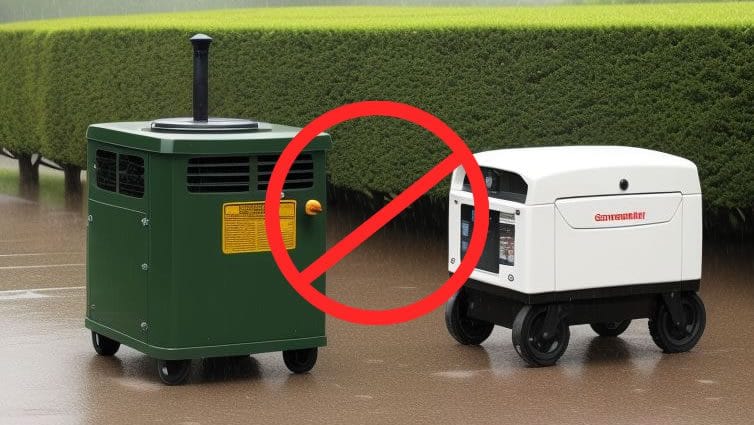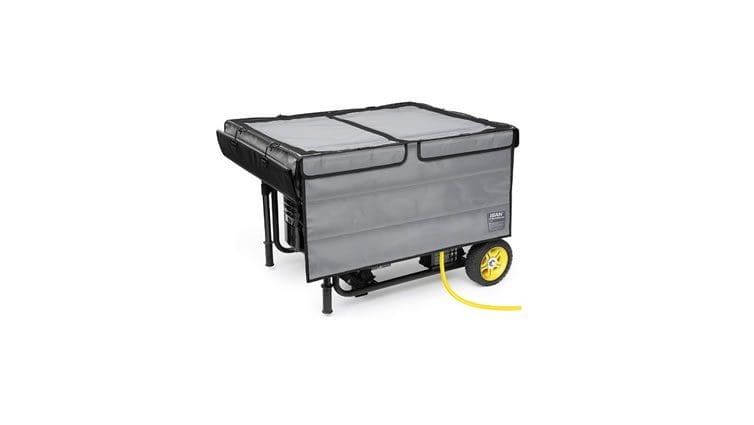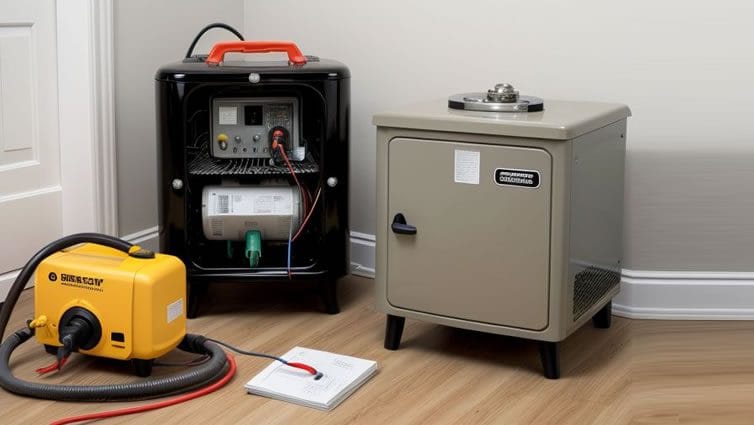Can Portable Generators Run in Rain? Essential Safety Tips You Need to Know
When stormy weather hits and the power goes out, your first instinct might be to fire up the portable generator. But wait—can portable generators run in rain? It’s a question many people ask, especially when they need power the most during a downpour. The short answer: it’s not as simple as plugging it in and hoping for the best! Using a portable generator in wet conditions can be dangerous if you’re not careful.
In this guide, we’ll walk you through essential safety tips to protect both you and your generator when the rain starts pouring. From waterproof covers to positioning your generator properly, we’ve got everything you need to know to keep your power going, rain or shine!
1. Why Generators and Rain Don’t Mix
The simple answer to the question, “Can portable generators run in rain?” is no, they aren’t designed for wet conditions. Portable generators, like most electrical devices, are sensitive to moisture. Running one in the rain exposes it to water, which can lead to serious problems like short-circuiting or even electrocution. The combination of electricity and water is, quite frankly, dangerous. You wouldn’t plug your phone charger into a socket while standing in a puddle, right? The same logic applies to your generator.
Generators need to stay dry to work properly and safely. When water enters the electrical outlets or components, it can cause malfunctions, damaging the machine or potentially harming you. In short, running a generator directly in the rain is not just bad for the machine—it’s bad for your health too!
2. How to Keep Your Generator Dry in Wet Weather
Now that we’ve established that running your generator in the rain isn’t a good idea, what can you do when you need power during a storm? Don’t worry—you’ve got options! One of the easiest solutions is to invest in a generator tent or cover. These handy accessories are specifically designed to protect your generator from rain while still allowing proper ventilation. You can find a variety of waterproof covers here.
If you’re wondering, “Can portable generators run in rain if I use a cover?”, the answer is yes, but only with proper ventilation. Generator covers come in various shapes and sizes, but the key is to choose one that gives adequate protection without trapping harmful fumes. You can also build a simple shelter using tarps or other waterproof materials to shield your generator. Just make sure there’s plenty of space for air to flow and keep the generator off the ground to avoid pooling water beneath it.
Another great tip is to position your generator in a naturally sheltered area, like under a carport or a porch roof. Always keep your generator at least 15 feet away from your home to avoid carbon monoxide buildup. With the right precautions, you can safely use your portable generator even when it’s pouring.
3. What Happens If Your Generator Gets Wet?
Accidents happen. Maybe you didn’t get that cover in place fast enough, or a gust of wind blew rain directly onto your generator. So, what should you do if your portable generator gets wet? First, turn it off immediately. Water and electricity don’t mix, so you don’t want to risk short-circuiting the generator or getting shocked. After turning it off, carefully move the generator to a dry area where it can dry out completely before trying to start it again.
If you suspect that water may have gotten into the electrical components or the engine, it’s best to call a professional for help. Trying to fix a water-damaged generator yourself could lead to further issues. In some cases, the water might cause corrosion, or worse, it might make the generator unsafe to operate. It’s better to be cautious and have an expert check it out if there’s any doubt.

Generators are built to withstand some rough conditions, but heavy exposure to rain and moisture can do significant damage. Regular maintenance, including keeping it dry, is the key to ensuring your generator’s long life.
4. Moisture-Proofing Tips for Longer Generator Life
It’s not just the rain you need to worry about—moisture in general can be harmful to your portable generator. If you live in a particularly humid area, or your generator is frequently exposed to morning dew, there are some simple steps you can take to protect it.
First, store your generator in a dry, covered area when not in use. A well-ventilated shed or garage is ideal. If you can’t store it indoors, use a weather-resistant cover to protect it from moisture and the elements. Regularly inspect the generator for any signs of rust or corrosion, especially around the electrical outlets and engine components. Cleaning and drying your generator after each use will go a long way in preventing moisture buildup.
It’s also a good idea to run your generator periodically even if you don’t need it. This helps prevent moisture from settling inside the machine, and it keeps all parts lubricated and functioning properly. Think of it like taking your car for a spin after it’s been parked for a while—it keeps everything in good working order!
5. Electrical Safety First: How to Avoid Hazards in Wet Weather
One of the biggest risks when running a portable generator in the rain is electrocution. Water can easily conduct electricity, so it’s crucial to ensure that your generator is set up properly before you use it during wet weather. Always use heavy-duty, outdoor-rated extension cords that are designed to handle wet conditions. These cords are typically insulated to prevent water from entering the connections and causing a short circuit.
Additionally, make sure to use a transfer switch when connecting your generator to your home’s electrical system. A transfer switch safely isolates your home’s electrical system from the utility grid, reducing the risk of back-feeding electricity into the grid, which can be dangerous for utility workers and others. Grounding your generator is another essential safety measure. This helps dissipate any stray electricity, reducing the risk of electrical shock in wet conditions.
6. Emergency Measures: Quick Fixes When the Weather Catches You Off Guard
Sometimes, you might find yourself caught in a downpour before you can take all the necessary precautions. What should you do in a situation like this? First, always have a plan. Know where you can quickly move your generator to keep it dry in case of unexpected rain. If you’re unable to move it, you can use a tarp or any waterproof material to temporarily cover it while ensuring there’s enough airflow.
Remember, the key to running a portable generator safely in the rain is to prioritize dryness and proper ventilation. While the answer to “Can portable generators run in rain?” might be “no” on its own, a little preparation and the right safety measures can turn that into a solid “yes, but…” under the right conditions.
By staying informed and following these essential safety tips, you can ensure your portable generator keeps running when you need it most—without putting yourself or your equipment at risk.




